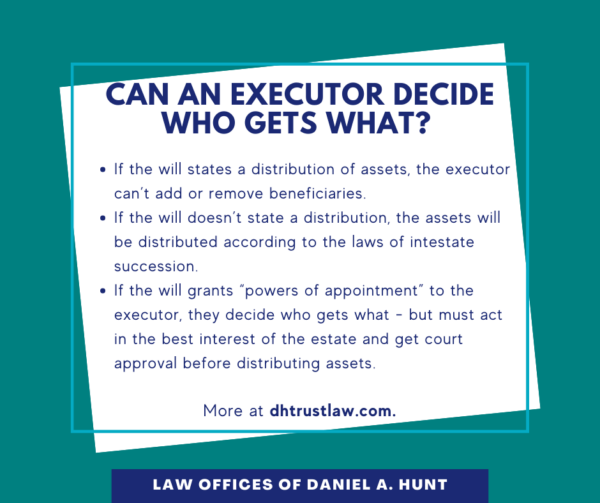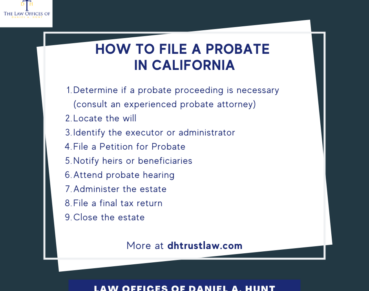Can an Executor Decide Who Gets What?

When a person creates a will, the person they select to carry out their last wishes is called an executor. Sometimes after a family member passes away, the heirs wonder how much power an executor has over the administration of the estate. Can an executor decide who gets what?
Executor Duty to Administer the Will
If the deceased person created a will that named beneficiaries, the executor of the estate must ultimately distribute the estate assets to the named beneficiaries as outlined in the will. They are not allowed to change the distribution by adding in or removing beneficiaries. Even if they believe that assets should be distributed differently, the executor must follow the testator’s directions in the will.
Further, the executor must first obtain a court order before distributing estate assets. If there is ambiguity in the will, the executor does not have the power to interpret the decedent’s intent on their own without court approval.
With that said, the executor does have some flexibility in the way they distribute assets of the estate. For example, they may opt to sell certain property or assets in order to deal with creditors or pay for estate administration expenses, while distributing the remaining assets as outlined in the will.
What If the Will Doesn’t Name Beneficiaries?
If the decedent created a will that did not name estate beneficiaries, then the estate should be distributed according to the California laws of intestate succession to the decedent’s nearest living relatives. The executor must still go through the probate process and obtain a court order before distributing estate assets.
What About Powers of Appointment?
Sometimes a will contains special language and grants an executor something called “powers of appointment”. Powers of appointment give the executor legal authority to choose the beneficiaries of a will after the decedent’s death. A testator may grant powers of appointment to an executor and expect them to divide the estate up fairly amongst the heirs after their passing.
Remember that executors have a fiduciary duty to act in the best interest of the estate and avoid any self-dealing. Even with powers of appointment, they must still receive court approval before distributing assets.
Executors with powers of appointment should seek advice from an experienced probate attorney before distributing estate assets to avoid tax liability. For example, when distributing the decedent’s personal property or real property to heirs, they must be careful to avoid accidentally making a gift in the eyes of the IRS that will trigger personal tax liability.
Can a Beneficiary Seek to Replace the Executor?
If you are a beneficiary and feel like the executor is not fulfilling the duties of the job correctly, you may ask the court to remove and replace the executor. A judge will likely remove the executor from office if they:
- Waste, embezzle, mismanage, or commit fraud on the estate.
- Are not qualified to serve as executor.
- Have neglected the estate or their duties as executor.
- Have violated any law requiring removal.
The beneficiary would need to file a petition for removal with the probate court and provide evidence that the executor is unfit to serve. This is typically filed along with a petition suggesting a replacement executor. The petitioner bears the burden of proof in matters such as these.
Under California state law, you may seek the removal of an estate executor before they take action detrimental to the estate or its beneficiaries. If you have evidence that the executor is preparing to take such action, waste no time in seeking the advice of an experienced estate litigation attorney.
If you have any questions about whether an executor can decide who gets what, feel free to contact our law firm.
Law Offices of Daniel A. Hunt
The Law Offices of Daniel A. Hunt is a California law firm specializing in Estate Planning; Trust Administration & Litigation; Probate; and Conservatorships. We've helped over 10,000 clients find peace of mind. We serve clients throughout the greater Sacramento region and the state of California.




